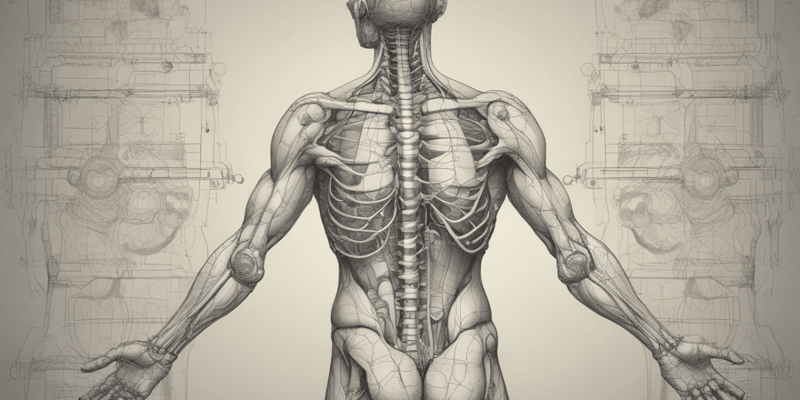28 Questions
Which plane divides the body into left and right halves?
Sagittal Plane
Which term refers to the back or rear side of the body or body part?
Posterior
What does the term 'inferior' mean?
Below or away from the head
What does the term 'lateral' refer to?
Outer side or away from the midline
What does the term 'plantar' pertain to?
Sole or bottom surface of the foot
What does the term 'distal' refer to?
Farther away from the point of attachment or origin
What does the term 'dorsal' pertain to?
Back or upper side of the body or body part
What does the term 'prone' refer to?
Body lying face down
What does the term 'superficial' refer to?
Closer to the surface of the body
What does the term 'afferent' relate to?
Nerves or vessels that carry information toward a central point
Which plane divides the body into upper and lower portions?
Horizontal/Transverse Plane
Which term refers to a position closer to the midline of the body?
Medial
Which term refers to a position farther away from the point of attachment or origin?
Distal
What does the term 'posterior' refer to?
The back or rear side of the body or body part
What does the term 'superior' mean?
Above or toward the head, upper part, or higher position
What does the term 'anatomical position' refer to?
The standard reference posture used to describe body structures and movements
What does the term 'sagittal plane' divide?
The body into left and right halves
What does the term 'frontal/lateral plane' divide?
The body into front (anterior) and back (posterior) portions
Which term refers to a position closer to the center or core of the body?
Medial
What does the term 'efferent' relate to?
Relating to nerves or vessels that carry information away from a central point
What does the term 'abduction' refer to?
Movement away from the midline of the body
What does the term 'extension' mean?
Straightening movement that increases the angle between two body parts
What does the term 'internal rotation' pertain to?
Rotation of a limb or joint toward the midline of the body
What does the term 'circumduction' involve?
Circular movement that involves a combination of flexion, extension, abduction, and adduction
What does the term 'pronation' refer to?
Rotational movement of the forearm that turns the palm downward
What does the term 'dorsi flexion' involve?
Movement of the foot and toes upward, bringing the top of the foot toward the shin
What does the term 'external rotation' pertain to?
Rotation of a limb or joint away from the midline of the body
What does the term 'hyperextension' involve?
Excessive extension of a joint beyond its normal range of motion
Study Notes
Anatomical Divisions and Terminology
- Sagittal plane divides the body into left and right halves.
- Transverse plane separates the body into upper and lower portions.
- Frontal (or lateral) plane divides the body into anterior (front) and posterior (back) sections.
Body Orientation and Position
- Posterior refers to the back or rear side of the body.
- Anterior denotes the front side of the body.
- Superior means a position higher or above another part.
- Inferior refers to a position lower or below another part.
- Medial indicates a position closer to the midline of the body.
- Lateral describes a position farther away from the midline.
- Proximal pertains to a position closer to the point of attachment or origin.
- Distal refers to a position farther away from the point of attachment or origin.
- Central denotes a position closer to the center or core of the body.
- Superficial describes a position closer to the surface of the body.
Movements and Actions
- Prone refers to a position lying face down.
- Supine describes a position lying face up.
- Abduction involves moving a limb away from the midline of the body.
- Adduction means moving a limb toward the midline.
- Flexion refers to decreasing the angle between body parts.
- Extension involves increasing the angle between body parts.
- Hyperextension means extending a body part beyond its normal range of motion.
- Internal rotation pertains to rotating a limb towards the body's midline.
- External rotation refers to rotating a limb away from the body's midline.
- Circumduction involves circular movement of a body part.
- Pronation refers to the inward rotation of the forearm or foot.
- Dorsiflexion involves lifting the foot upwards at the ankle.
- Plantar pertains to the sole of the foot.
Neural Terminology
- Afferent relates to incoming sensory signals to the central nervous system.
- Efferent refers to outgoing signals from the central nervous system to muscles or glands.
Anatomical Positioning
- Anatomical position is a standard reference posture: standing upright, facing forward, arms at the sides, with palms facing forward.
Test your knowledge of anatomical position, planes, and body movements with this informative quiz. From understanding the standard reference posture to identifying different planes and their functions, this quiz will help you reinforce your understanding of human anatomy. Challenge yourself and expand your anatomical vocabulary with this engaging quiz.
Make Your Own Quizzes and Flashcards
Convert your notes into interactive study material.




